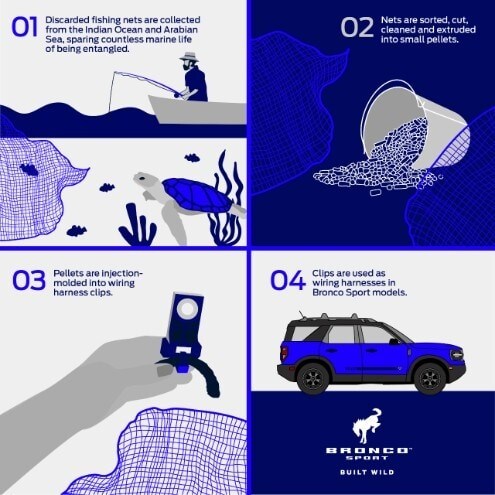

Ford is adding to its legacy of using sustainable materials and production processes in its vehicles. Now, it is the first automaker in history to use 100% recycled ocean plastics in the production of its car parts. The Ford Bronco Sport will feature wiring harness clips produced using discarded plastic fishing nets, and is the first of many of Ford’s plans to take advantage of these materials that are otherwise harming the environment.
If you find yourself wondering why an automaker would put recycled plastic in a car, you are not alone. This is a reasonable question to ask, and the answer might just surprise you; recycled plastics not only require less energy to produce, but also provide a durable, low-cost material that is quite comparable in quality to the petroleum-based plastic currently used. The material has been proven to be as strong and durable as petroleum-based clips, so quality will not be an issue with this new concept. Not to mention, this recycled plastic can be used at 10% cost savings, providing both environmental benefits as well as benefits for the business and the customer.
Ford is building its legacy as a leader in sustainability and first-mover into this area of the sustainable automobile industry. These small parts made of recycled ocean plastics are the first step in the company’s big vision for a future in which other parts and other models are produced using these recycled ocean plastics. With upwards of 13 million metric tons of plastic entering the ocean via land every single year, Ford’s initiative is helping to save marine life and improve already polluted shorelines.
Furthermore, Ford’s new concept is spurring job creation throughout the development process. DSM Engineering Materials will work to collect plastic material from the Indian Ocean and the Arabian Sea. This plastic will be used to create an array of products, and for the first time ever, automotive parts are an item in that list.
Other parts Ford expects to develop using recycled ocean plastics in the future include transmission brackets, wire shields, and floor side rails. All of these parts are stationary parts with a demand for strength and durability that this recycled plastic is more than capable of exceeding.
This isn’t a first for Ford, however. Most recently, the automaker utilized the power of recycled water bottles to develop noise-reducing, lightweight, and aerodynamic-enhancing underbody shields on its 2020 Ford Escape. This new initiative is creating new opportunities for jobs, cost savings, positive environmental impact, and saving marine life. You can rest assured that this is just the beginning of the Ford legacy of using recycled plastic and we cannot wait to see all that Ford’s future has to bring.